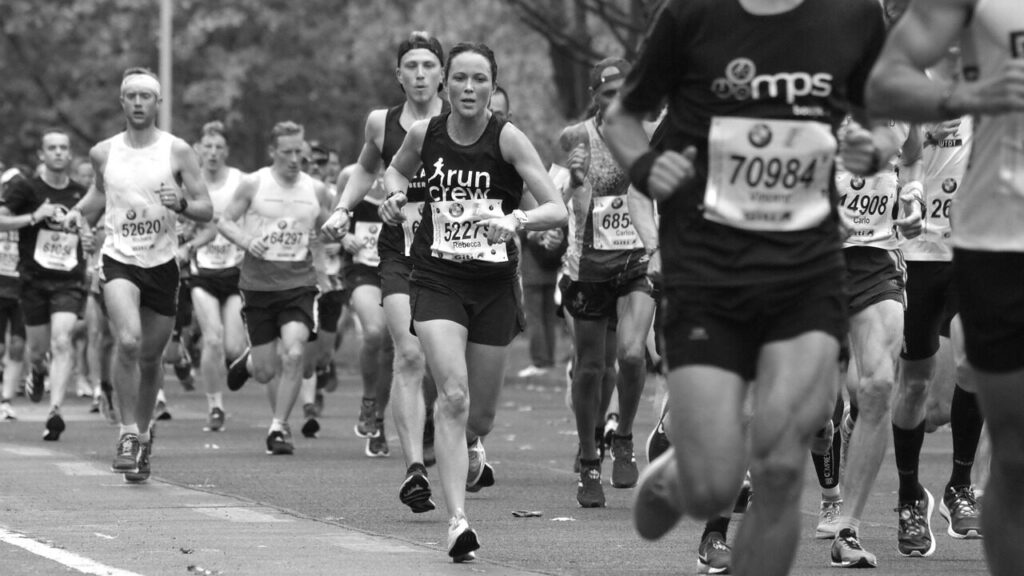The marathon, with its iconic 26.2-mile distance, stands as a monumental achievement for runners from all walks of life. From elite athletes shattering records to everyday individuals pushing their limits for charity, marathons inspire countless participants every year. Aspiring marathoners may find themselves questioning what constitutes a good marathon time, especially in relation to qualifying for prestigious events like the Abbott World Marathon Majors, including the Boston Marathon. This article aims to shed light on marathon finish times, offering insights that will help runners establish their goals or gauge how their current personal records compare.
Fastest Marathon Times
Before diving into amateur statistics, it’s insightful to examine the elite marathon times that often leave us in awe. These world-class athletes maintain speeds that most would struggle to sustain even over shorter distances. The current men’s marathon world record is held by the late Kelvin Kiptum, who clocked in at a staggering 2:00:35 during the 2023 Chicago Marathon. Tragically, Kiptum passed away in a car accident in February 2024, shortly after setting his sights on becoming the first runner to break the 2-hour barrier in open competition.
For the women, Ruth Chepngetich of Kenya achieved a groundbreaking world record of 2:09:56 at the 2024 Chicago Marathon. Chepngetich not only set a personal best but shattered the previous marathon record of 2:11:53 held by Tigst Assefa of Ethiopia. These elite times remind us of the extraordinary capabilities of human endurance, urging amateur runners to aspire toward their personal bests.
Understanding Good Marathon Times for Amateurs
For many runners, simply completing a marathon is an achievement worth celebrating. However, for those who have run a few marathons, the quest to improve their finishing times can become an exhilarating challenge. Understanding where you stand in relation to the wider running community can provide motivation and clear targets for your next race.
We analyzed data from three major marathon events—the Tokyo, Chicago, and London Marathons—to calculate average, good, and exceptional marathon times for amateur runners. Runners can use these metrics to understand how their times compare, and to define personal performance benchmarks. If you’re curious about where you fit into this spectrum, or if you’re aiming to get faster, these insights are quite valuable. Just completing the 26.2-mile race is a remarkable goal, but improving your time can add an additional sense of accomplishment.
World Marathon Majors: Course Records and Qualifying Times
The World Marathon Majors (WMM) is a series of six iconic marathons across the globe. These include the Tokyo, Boston, London, Berlin, Chicago, and New York City Marathons. Completing all six events earns a coveted Six Star Medal, but achieving entry into these major races often requires specific qualifying times. For instance, the Boston Marathon does not utilize a lottery system and requires runners to meet strict qualifying standards based on their age and gender.
Entry to the Tokyo Marathon, for example, hinges primarily on a lottery system, while the qualifying times for the Boston Marathon require male runners to finish in under 2:55 and female runners under 3:25 in certified events. Understanding these qualifying benchmarks can help runners establish realistic goals that align with their capabilities.
Course Records for Notable Races
Each of the World Marathon Majors boasts impressive course records. In the Tokyo Marathon, the men’s record is held by Benson Kipruto with a time of 2:02:16, while the women’s record is 2:15:55 by Sutume Asefa Kebede. In the Boston Marathon, Geoffrey Mutai set the standard for men at 2:03:02, and Bezunesh Deba holds the women’s record at 2:19:59. These records demonstrate the high-performance levels achievable in marathon races.
Furthermore, it’s important to note that the recent surge of technological advancements in running shoes and training techniques has resulted in remarkable improvements in marathon times. The potential for breaking existing records appears increasingly attainable, encouraging runners to aim high.
The Future of Marathon Running
With the marathon landscape continuously evolving, aspiring elite runners like Kelvin Kiptum were pushing boundaries, showing us how the sub-2 hour marathon may soon be within reach. Innovations in nutrition, training regimens, and technology are making a significant impact on performance. The coming years will be fascinating as more athletes strive to break records and redefine the limits of marathon running.
As we anticipate future achievements in the sport, it remains essential to appreciate the joy and fulfillment that comes with completing a marathon, regardless of the time on the clock. Setting personal bests and chasing goals are commendable pursuits, but maintaining a love for the sport is ultimately what keeps runners returning mile after mile.
Whether you’re an experienced marathoner or a curious newcomer, understanding marathon times—from elite records to amateur benchmarks—provides helpful insights that can guide your training and racing strategies. For those seeking to qualify for esteemed marathons, knowledge of course records and qualifying times can illuminate your path toward achieving your running ambitions.
